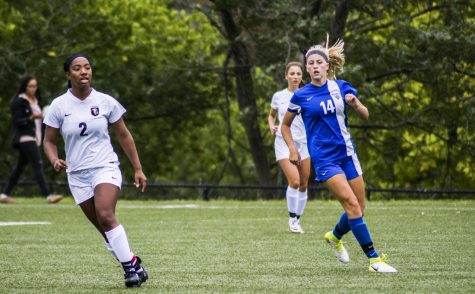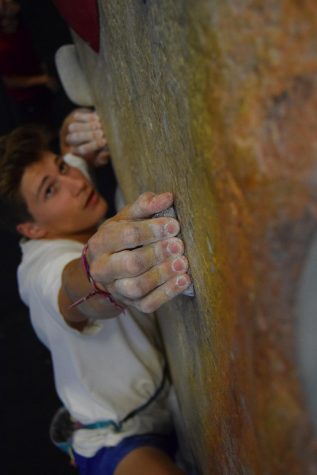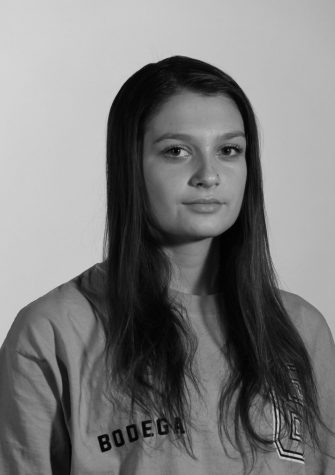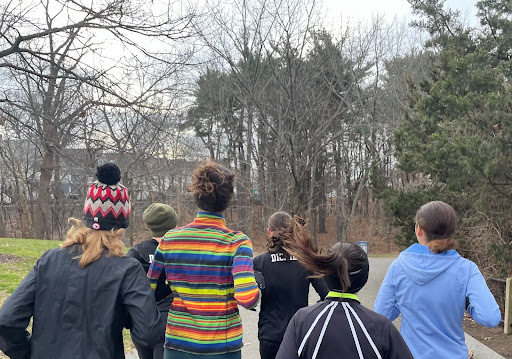Club Sports Offer Different Athletic Opportunities
September 27, 2017

Senior Danielle Reeves plays soccer for CRLS and for a club team.
Similar to most high school athletes, junior Ben Eckstein goes to practice after school, does workouts, and trains as hard as he can for his competitions. But unlike other student athletes in the school, Eckstein’s team isn’t made up of his classmates. He competitively climbs for Central Rock Watertown, a club team.
The high school doesn’t offer a climbing team, but according to Eckstein, it could be a good idea. “It’s definitely much more of an individual sport. You have your own workouts, your own schedule to practice,” Eckstein said, “but there’s still a team and a community aspect of it.”

Junior Ben Eckstein climbs competitively for Central Rock Watertown, a club team.
Eckstein isn’t the only one who plays for a team other than the Falcons. Junior Jonas Hansen is the captain of the school fencing team, but he also competes for Olympia Fencing, a club team in Cambridge.
According to Hansen, there are a lot of differences between his club team and the school team, player experience being one of them. “The majority of people doing the school team are new to fencing, and people in the club have many years of experience,” Hansen said. “A few of us are going to international tournaments, and then the school is just fencing for the school.”
Although his club team is more competitive, Hansen said that the school team does have a draw of its own: community.
“For my personal fencing career, I would prefer going to these national tournaments,” Hansen said. “But teaching other people how to fence at the school is awesome—it’s more of a team. The club is more individual and fractured, but at the school, you have a strong team sense.”
Senior Danielle Reeves also plays on two teams. She plays defense for the girls varsity soccer team, but she also plays for a club team called GPS Metro Boston.
According to Reeves, the coaching for the two teams is very different, but in terms of team bonding, she does feel that one is stronger than the other.
“I would say I’m closer with my school team,” Reeves said. “I know them outside of soccer.”
Traditions such as wearing their jerseys on game days makes the school team feel closer to each other, says Reeves.
“It’s more of a team-feel with the school,” she concluded. “[Wearing jerseys] shows that we’re one unit.”
The Massachusetts Interscholastic Athletic Association (MIAA) recognizes that with students playing on school and club teams, it’s possible that an athlete could miss a practice or game because of an out-of-school commitment. Rule 45 in the MIAA handbook states that “members of a school team are precluded from missing a high school practice or competition in order to participate in a non-school athletic activity/event in any sport recognized by the MIAA.” According to the handbook, a first offense against this rule is a suspension for 25% of the season, and a second offense is additional suspension for another 25% of the season, and an ineligibility to compete in the State Tournament.
Director of Athletics Tom Arria said that being on a team creates a valuable life lesson for student athletes. “You are committed to each other, you’re there for [each other], you’re doing the best you can do, you’re working hard and all working towards a common goal,” Arria said.
Arria also said that although club teams may offer different opportunities for athletes, playing for Cambridge is something that you can’t replicate. The experience of “wearing the city name on your chest, being with your peers who you grew up with and you see every day” is unlike any other sporting experience, he said. Arria concluded, “I believe sincerely that there’s nothing like representing your home school team.”
This piece also appears in our September print edition.










